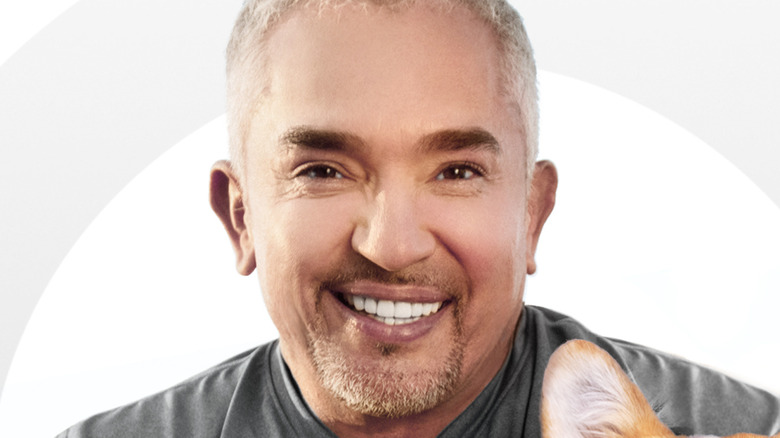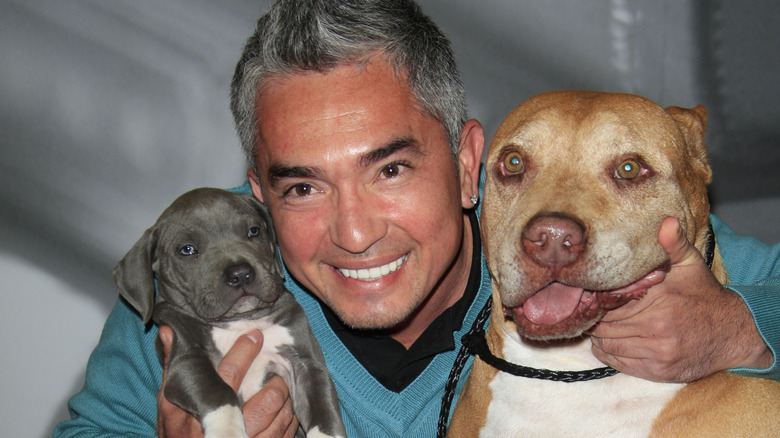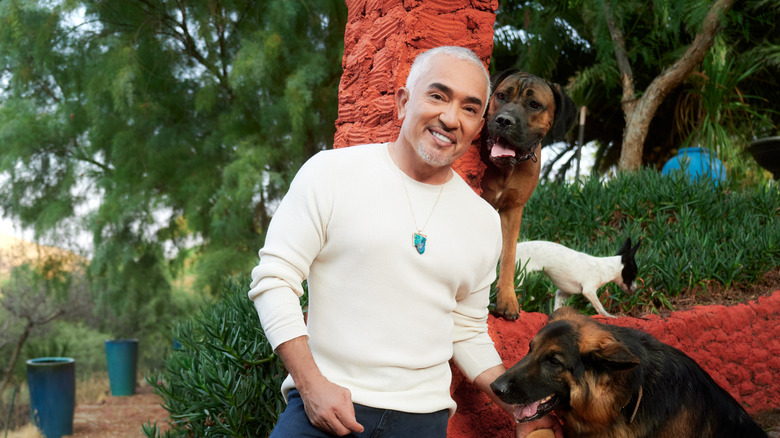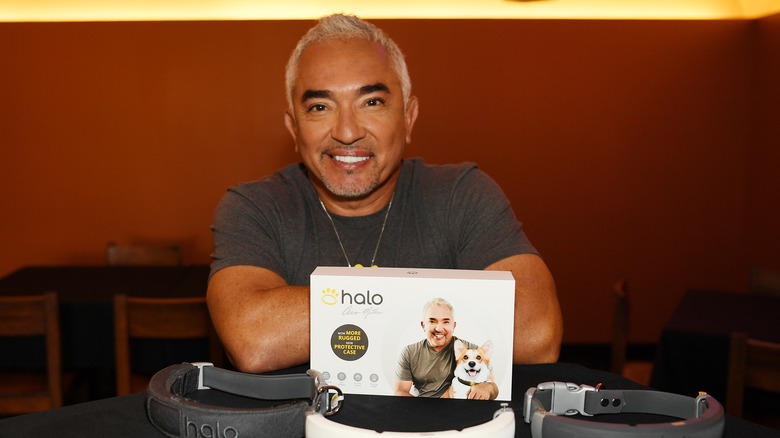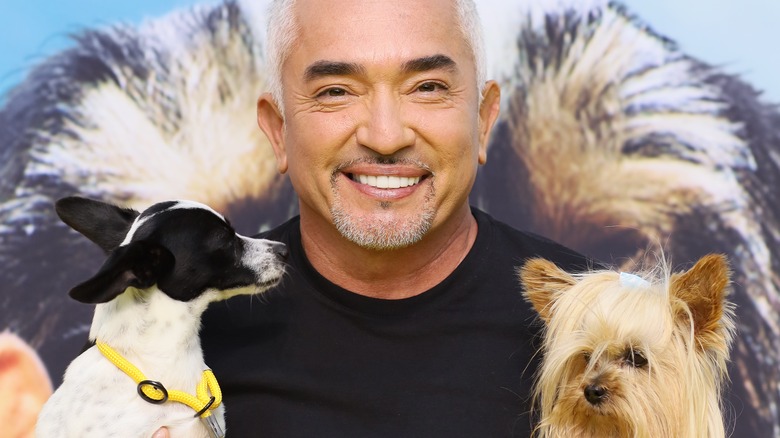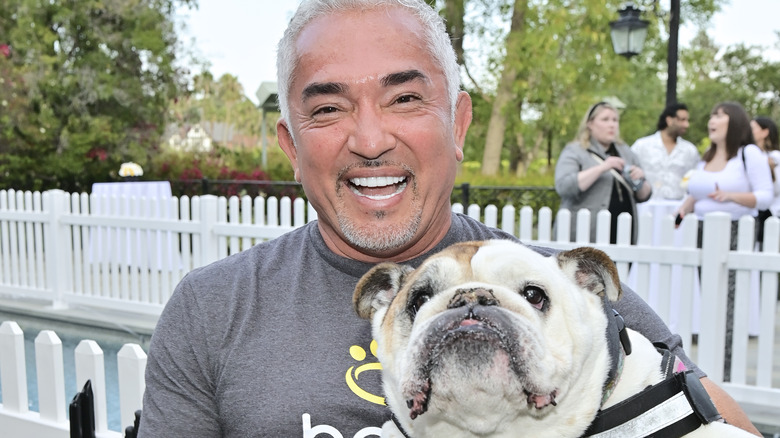Dog Whisperer Cesar Millan Talks His Latest Tips And Tools For Dog Parents - Exclusive Interview
Dogs, the old saying goes, are man's (or woman's) best friend. But like some friends, they can be as difficult as they are charming: When they're not melting our hearts with tail wags and kisses, they might be chewing our shoes, digging up our gardens, terrorizing our neighbors, or some unpredictable combination of all of these. While you can tell your human friends (as kindly as possible, of course) that their behavior is unacceptable and they need to get a grip, figuring out how to communicate this to a bright but nonverbal canine can be vexing.
This is where dog behavior expert Cesar Millan comes in. A lifelong animal lover, Millan has made a name for himself helping dog owners better understand and communicate with their dogs. His TV show "Dog Whisperer" has been broadcast in over 100 countries (per his website), and his newest show on National Geographic, "Better Human, Better Dog," further documents his quest to help people cultivate healthy relationships with their dogs. In an exclusive interview with The List, Millan shared more about his journey and discussed his latest technological innovation for dogs and dog parents.
Growing up on a farm taught Cesar Millan the importance of communicating with animals
How did you first realize that you had this special connection with dogs?
Since you mentioned Mexico [before the interview], as you see my people, we have a completely different way to connect to the earth. Mexicans are very much into spirituality. Mexicans are very much into connection with Mother Nature, Earth. We have strong traditions and passion. Since I was little, I had this connection with Mother Nature.
I grew up on a farm, so I grew up with a belief that you have to gain trust and respect so the animals can give you their loyalty. My first language, in a way, was talking to animals. I didn't know — I thought it was a farm behavior until I came to America, and then I said, "Wow, what I learned from my grandfather is something I can share with people. I just have to put words into the feeling."
Cesar Millan does not consider himself a dog trainer
You have been working with dogs and training dogs for a long time. Have your dog training techniques changed over the years? If so, how have they evolved?
I don't train dogs, so it's a difference between training and rehab. There's people that rehabilitate people, and there's people that train people. I don't train dogs; I train humans so they learn how to connect, communicate, and have a relationship. In that training, I teach people about energy, philosophy, and activities. The activities [are] where you can find training techniques or strategies. [Connection, communication, and having a relationship are] one, two, three.
The number three is techniques or strategy. But number one is the most important because they're animals, and animals pick up on your energy. Before you even think, you have to know what energy you have. Before you even say, "I want to do this with you," you have to know what energy you have.
You can't go in with the mentality, "I'm going to train you even if my energy is wrong," or even if my mentality is wrong. That's why I focus so much on training humans to understand the most basic knowledge that we should never forget. It's very Eastern, what I teach. It's about energy; it's about yin and yang. It's about not working against nature.
That's why I was asking about your ethnicity [before the interview], because when I do shows in Asia, when I speak this way, they connect quicker than Westerners. Westerners are more intellectual and Easterners are more [about] nature; it's more [about] ancestors. Latinos or Mexicans have a lot in common with Asians.
Cesar Millan sees technology becoming a bigger part of dog training
Another core interest of yours is the use of technology in dog training, which seems to be a little bit of a jump from some of the spiritual stuff you were talking about. Could you share some examples of some of the new technologies that you use to train people and dogs?
Technology is for connection, communication, and relationship. A leash is the first technology that humans invented, right? We needed to have something if an animal walks away, so we create a rope, and then we put it [on the animal]. Then we have to learn how to convince the animal not to fight, flight, or avoid. But technology is moving extremely fast, and humans are becoming more and more intellectual about it. People understand this more than a dog.
Nowadays, you see kids watching this or [using] a tablet. In my era, I was outside mingling with the ocean or mingling with a coconut tree, mingling with animals. That was my connection, communication, and relationship. I have to adapt to the times — people are definitely more savvy about technology. We created a technology that actually mirrors what I teach. That's why we created the Halo Collar.
The Halo Collar helps dogs understand and respect boundaries
Can you tell me more about that?
The Halo Collar is mainly to help a dog and the human to maintain rules, boundaries, and limitations, especially when you're not there.
The other thing that does extremely well is ... The indoor life is one life that's ruled by limitations. The outdoor life is "follow, play, explore." That's when the dog needs to walk with you, play with you, explore with you. But a lot of people are afraid because some dogs go after squirrels; some dogs go after other dogs. With some dogs, people are afraid that the dog will never come back. This gives you the freedom to have the certainty of practicing this simple behavior, this natural behavior, that allows the connection. You need to have the activities for the dog to be connected with you.
Can you give me an example of how that might work in practice? Say your dog has a Halo Collar on and you're outside, what would it do? How would it affect the dog's behavior or your behavior?
First of all, once you have something that is going to help you, it calms your energy. A lot of times, dogs go away if your energy is tense or if your energy is nervous. Remember, he's animal, species, dog, breed, [and] name. The animal in them is going to be affected by your energy, so having the right tool ... Obviously, people trust me and respect and love me, so having the right tool eases the energy of the human, and then [you] have an understanding [of] how to set up the imprint that we teach during this. It is an instruction manual that if you follow for 21 days, you create an imprint. It takes 21 days to create a behavior, so you can't skip those 21 days.
Once you go and practice and practice and practice, you're going to see that now you say, "I'm going to ask my dog to follow me," or "I want to play with my dog," or "I want to explore with my dog." It gives you this organized way of being versus, "Whatever my dog wants to do, let him do it." [That's] not organized. When you're not organized on behavior, you create this chaos.
[The Halo Collar] keeps you calm and it keeps you organized, and it gives you the outcome that you're looking for — which is to have a safe, peaceful, loving time outdoors where your dog can actually interact with other dogs, or if the other dog is not well-behaved, you know how to detect that other dog. In a way, I want that once you see the Halo Collar, you know that the dog has rules and limitations and you know that the dog is connecting [and] has a communication relationship ... If you see a Rottweiler, you're going to see a dog with a Halo Collar [and think], "That dog is well-behaved."
Cesar Millan warns that getting a dog is a serious decision
A lot of people who had never had dogs before got dogs during the pandemic. Have you noticed any specific behavioral challenges with these pandemic puppies or with new people owning dogs who probably hadn't thought about it too much?
Let's put it into a more practical perspective where people will get it quicker. Rescuing a dog is a beautiful thing. It shouldn't be a bad thing, but rescuing a dog or entering into a relationship without the knowledge is the same thing as you getting a franchise and you have no idea what to do with it.
It logically doesn't make any sense that we enter into anything if we don't have the knowledge. It should never be an emotional impulse, because emotional impulse is just the moment of seconds where you feel this way. It is like an emotional buy. It's an emotional thing. It is not well thought out.
When you think about the relationship, you have to think about 10 years, 15 years, 16 years, 21 years with a dog. Most people [think], "I need a dog because I'm bored right now," or "I need a dog because I feel lonely. I need a dog because I always wanted a dog." That's beautiful — that makes you rescue the dog, but that doesn't mean you know how to maintain the dog.
The relationship is a long run. It's not a short run; it's a long run. It's like how many times people go into relationships, but they don't have the education, so they get divorced. You have to go in understanding the spirituality of the other person, the instincts of the person, the emotions of the person, and the intellect of the person.
It's [those] four things that [are] going to allow you to be a responsible adopter. Of course, dogs are going to develop issues [if] someone who just has a big heart rescued them. You need the knowledge. Knowledge is different from heart.
Here's what you need to know before you get a dog
On all your shows — right now, you have "Better Human, Better Dog" — you deal with a lot of people who've gotten into a bad place with their relationships with their dogs. How would you recommend that people avoid these situations in the first place if they haven't gotten a dog yet and they're going to get one?
Self-analysis. The dog is going to bring out the good side of you and the bad side of you. The dog is going to awaken the dragons.
You have to deal with that secret that you've been carrying for a long time. The dog is just going to intensify what you already had. You already had the fear; you already had the anxiety; you already had the confusion. No dog gives it to the human. It's impossible for a dog to live with a human who hasn't worked on that toxic side of themselves.
Self-analysis is something that is becoming more and more in the conversation. Then you enter into self-love, self-value, self-knowledge. Those three things are like, "How much do I love myself? How much do I value myself?" That's really [like] whoever marries you or whoever lives with you, you end up dealing with.
That's one thing. I love the transition that humanity is doing because we're talking more about spirituality; we're talking more about natural, simple, profound; we're talking more about how love is part of it but not everything. We have to use our mind sometimes to turn it off or to be creative.
We are getting in touch with the four worlds: the spiritual world, the instinctual world, the emotional world, and the intellectual world. But the intellectual world has been leading for a long time. Remember, we are the only species that follows unstable leaders. My clients can be Harvard graduates, but they can't walk a Chihuahua. You can be super smart, [but that] doesn't mean that when it comes to Mother Nature, you have the capability to have connection, communication, [and] relationship in a natural, simple, profound way.
Visit Halo Collar to learn more about better communication with your dog.
This interview was edited for clarity.
